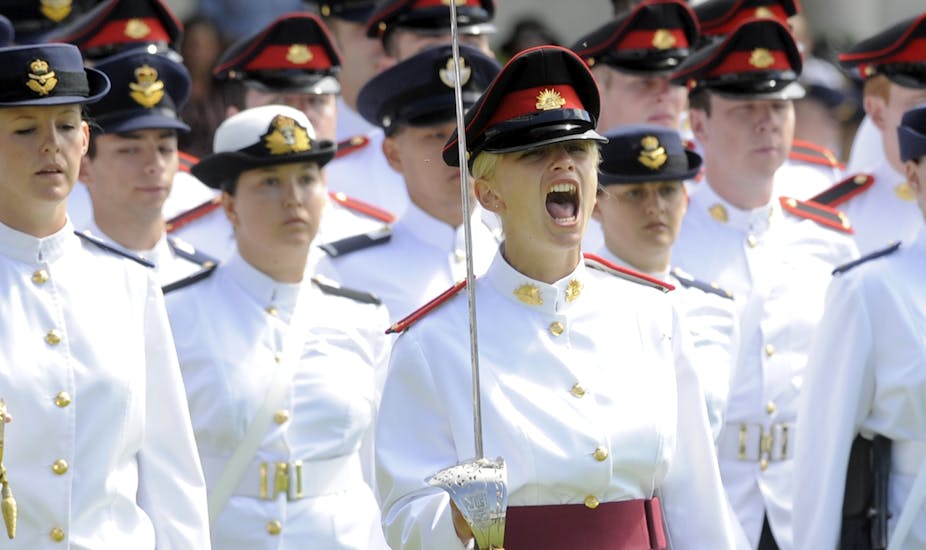The current media frenzy around the sex scandal enveloping the Australian Defence Force Academy, and the predictable response to reports that women will be fast-tracked into combat roles, illustrates the problems of organisational change.
The incident itself raised a multitude of issues about new technology but unchanging gender relations amongst young people.
These views reflect continuing wider attitude problems amongst many males who still see females as ‘fair’ game for sexual humiliation.
However, the reported ADFA responses to the incident, and subsequent actions show how little organisational change has happened in one of Australia’s biggest employers.
As early as 1996, a report on women in the ADF by Clare Burton made the point that leadership was the crucial issue if change was to come.
She said then: “Discrimination issues are leadership issues first and foremost. If unequivocal commitment and support from leaders is the critical leverage point, that is the key area where change in practices and behaviours must take place.
"Education on its own will not achieve this change. Strong accountability measures will make a significant contribution to it.
"The perception of managers, supervisors and Service members of the level of leaders’ commitment to successful gender integration has a profound effect on workplace practice and behaviour.”
This type of leadership was not evident in the ADFA staff actions before the issue went public, nor in their responses afterwards.
Defence Minister Stephen Smith’s reactions made it clear that he saw this type of behaviour as not acceptable. In particular, he objected to evidence that the young women involved was further publicly humiliated by being penalised on a separate issue at the same time.
Some media coverage also suggested that she had been advised to apologise for embarrassing other students and ADFA. (Smith has denied she was ordered to apologise; however the cadet has said she believed it was an order because of the rank of the officer). This type of institutional protectiveness of reputation at all costs raises questions on whether there is serious commitment to both fair process and change, rather than the appearance of change.
This viewpoint is borne out by the limited changes in the ADF since Burton’s report and contribution. A later Parliamentary briefing note in 2000 suggests that little has changed over the past decade.
Personnel statistics from the Department of Defence’s Annual report 1999-2000 showed that women made up 12.8% of the permanent ADF (6,507 women compared to 44,248 men). The percentage has grown by less than 5% over the past decade plus, suggesting that there has been little change in attracting women or raising their profile in the services.
Kathryn Spurling, a research fellow at the ADFA, in various radio interviews has referred to a ‘warrior culture’ in the ADF which is both sexist and racist.
Dr Ben Wadham, a sociologist at Flinders University and ex-infantry solider and military police officer last week in Crikey described it: “This culture is established around men and their ideas of manhood. Warfare is almost an exclusively male enterprise.
"The ADF is a predominantly male domain. When men seek to close ranks they exclude others and they use language and practices that marginalise, and subordinate those others. Perverse sexuality, racist terms, bullying and intimidation consolidate the boundary between a group of mates and ‘the enemy’.
"Binge drinking and sharing sexual adventures intensify the sense of being one. It is the dark side of mateship.”
Jim Wallace, ex-senior army man and now head of a conservative Christian lobby, on radio today expressed his alternate views on the same issue.
He sees women in front line jobs as undermining the male bonding processes of mateship and therefore ruining the fighting capacities of the defence forces. Although he is one of the few that would say this publicly, I suspect he represents the bulk of the more conservative members of the forces and their views explain why change is slow.
There are other retired members of the force who are attacking the Minister’s action that reflect similar views and offer evidence of why change is so slow.
Among the various changes announced by Smith was to speed up of the process, begun in 2001, allowing women into combat roles. This is an interesting initiative because it removes one of the possible excuses for seeing women as inferior - that is, they do not face the same combat risks. The slowness of the implementation of this particular policy is another sign that organisational change has been both hard and slow.
The examination of how women are treated by the Sex Discrimination Commissioner will hopefully be more successful than the Burton report in influencing changes. Another initiative is a ‘cultural stocktake’ to include alcohol, binge drinking and interpersonal behaviors. This research could be useful in changing attitudes in the wider society as well as the ADF. After all, these very new recruits did not entirely develop their attitudes in their 10 weeks in ADFA.
There are wider issues of slow change and parallels in many areas of employment in institutions of power. Women on ASX boards have progressed slowly and even gone backwards until this year, when they reached just over 10%.
Similarly, the proportion of women in the feeder groups for executive staff in major private firms seems to have stalled. Even in politics, despite a few visible high achievers, there is a drop in women in the ranks of power.
We can maybe make good use of the results of the plethora of change mechanism to provide us with useful clues for making changes in the many other still very macho institutions that still wield wide power and influence!

